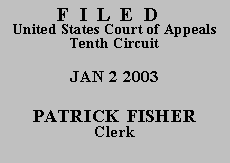

| RUTTER & WILBANKS CORP.; ELLIOTT A. RIGGS; WILLIAM R. THURSTON, Trustee; GORDON TANNER; WALTER K. ARBUCKLE TRUST; ERIC B. WELLS; KEVIN C. WELLS; CHARLES R. WIGGINS; KEN KAMON, |
|
| v. | |
| SHELL OIL COMPANY; SHELL
WESTERN E & P, INC.; MOBIL OIL
CORPORATION; MOBIL
PRODUCING TEXAS & NEW
MEXICO, INC.; MOBIL
EXPLORATION & PRODUCING U.S.,
INC.; EXXON MOBIL, INC.; CORTEZ
PIPELINE COMPANY, a partnership;
SHELL CO2 COMPANY, LTD., a Texas
limited partnership; KINDER
MORGAN CO2 COMPANY, a Texas
limited partnership,
-------------------------------------- |
|
| GERALD O. BAILEY and W. L.
GRAY& CO.,
Applicants in Intervention - Appellants. |
|
Bailey and Gray were owners of overriding royalty interests ("ORIO"s) in the McElmo Dome Unit. The September 2001 settlement agreement settling Rutter & Wilbanks and three related cases gave them the right to opt out of the settlement. On January 5 and January 7 of 2002, Gray and Bailey, respectively, opted out of the settlement. On January 10, 2002, they filed motions to intervene in Rutter & Wilbanks, which the district court denied essentially on the ground that they were untimely: "[g]iven the length of time this litigation, as an entire matter, has endured thus far, and the late date at which the applicants move for intervention, the Court will deny the motion." Order at 2, Appellants' App. at 22.
Additionally, Gray and Bailey are also involved in litigation in Texas involving the same defendants and claims involving CO2 production on the McElmo Dome Unit. In fact, Gray is a co-plaintiff in one proceeding with Harry Ptasynski, whose appeal of the denial of virtually identical motions to intervene we simultaneously affirm. See Rutter & Willbanks Corp. v. Shell Oil Co., Nos. 01-1565, 01-1567 (10th Cir. filed Dec. 24, 2002). Bailey is a co-plaintiff and co-defendant in various Texas proceedings with Bridwell Oil Co., whose appeal of the denial of its motions to intervene we affirmed along with Ptasynski's. See id.
Plaintiffs and Defendants argue that Bailey and Gray lack standing, having opted out of the settlement before they filed their motions to intervene.
It is well settled that, in order to show standing necessary to invoke federal court jurisdiction, a party must demonstrate three things:
(1) "injury in fact," by which we mean an invasion of a legally protected interest that is "(a) concrete and particularized, and (b) actual or imminent, not conjectural or hypothetical"; (2) a causal relationship between the injury and the challenged conduct, by which we mean that the injury "fairly can be traced to the challenged action of the defendant," and has not resulted "from the independent action of some third party not before the court"; and (3) a likelihood that the injury will be redressed by a favorable decision, by which we mean that the "prospect of obtaining relief from the injury as a result of a favorable ruling" is not "too speculative."
In re Integra Realty Res., Inc., 262 F.3d 1089, 1101 (10th Cir. 2001) (quoting Northeastern Fla. Chapter of the Associated Gen. Contractors v. City of Jacksonville, 508 U.S. 656, 663-64 (1993)). In In re Integra, we held that parties who had opted out of a settlement lacked standing to challenge the settlement because they "lack[ed] any legally protected interest that could support the 'injury in fact' element necessary to demonstrate standing." Id. at 1102; see also In re: Vitamins Antitrust Class Actions, 215 F.3d 26 (D.C. Cir. 2000) (holding that presumptive class members who had opted out of a settlement had no standing to challenge a specific clause in the settlement). We, and other courts, have recognized a narrow exception to this where nonsettling parties can demonstrate that they will suffer "'plain legal prejudice,' as when 'the settlement strips the party of a legal claim or cause of action.'" In re Integra, 262 F.3d at 1102 (quoting Mayfield v. Barr, 985 F.2d 1090, 1093 (D.C. Cir. 1993)) (further quotation omitted).
Bailey and Gray assert that they "have not sought 'limited' intervention to challenge the proposed settlement" but rather ask only that "they be allowed to intervene as parties in the case so that they may litigate their claims and protect their interests." Appellants' Reply Br. at 5. We agree with the Plaintiffs and Defendants in this case that, once they opted out of the settlement, Bailey and Gray lost any legally cognizable interest in the proceedings into which they wish to intervene. Further, they do not argue that they have suffered plain legal prejudice in that they have been stripped by the settlement of any legal claim or cause of action; indeed, they have been actively pursuing claims against Defendants in Texas.
Alternatively, were they able to identify some interest sufficient to confer standing, we would hold that the district court did not abuse its discretion in finding their motions to intervene untimely. See Utah Ass'n of Counties v. Clinton, 255 F.3d 1246, 1249 (10th Cir. 2001) ("We generally review a district court's ruling on the timeliness of a motion to intervene under an abuse of discretion standard.").
AFFIRMED.
ENTERED FOR THE COURT
Stephen H. Anderson
Circuit Judge
*.This order and judgment is not binding precedent, except under the doctrines of law of the case, res judicata, and collateral estoppel. The court generally disfavors the citation of orders and judgments; nevertheless, an order and judgment may be cited under the terms and conditions of 10th Cir. R. 36.3.